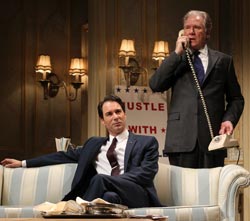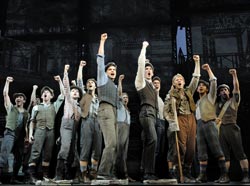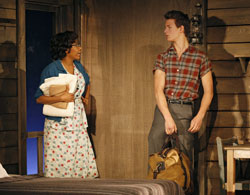Review: Gore Vidal's The Best Man
Apr 2nd

You may be wondering why Gore Vidal’s politically-themed drama The Best Man needed another revival a mere twelve years after its last Broadway outing. The better question is why hasn’t it been done in the interim, considering that we’ve had endured several highly contentious elections? Fortunately, it can now be seen in a wildly entertaining, star-studded production with the newly possessory title Gore Vidal’s The Best Man.
While this 1960 play is dated in some of its details—although not by much, considering how much talk there’s been lately about a possible brokered Republican convention—its portrait of political chicanery could not be more contemporary.
What makes the play work so well more than a half-century after it premiered is its crackling dialogue, which produces more laughs than most outright comedies. And while contemporary audiences are less likely to spot the obvious parallels between its characters and such historical figures as Nixon, Kennedy and Adlai Stevenson, they’ll certainly recognize the venality and ruthlessness on display.
The plot concerns the battle between two candidates for their party’s 1960 presidential nomination just before and during a convention. The opponents are William Russell (John Larroquette), a highly principled, intellectual Secretary of State with a propensity for womanizing, and the young, handsome Senator Joseph Cantwell (Eric McCormack), who will use any methods at his disposal to smear his opponents.
And he has a real smoking gun to use against Russell, in the form of a confidential medical report detailing a past nervous breakdown and psychological problems. So when Cantwell’s former army buddy (Jefferson Mays) shows up with information apparently proving a past homosexual dalliance, Russell is faced with the ethical dilemma or whether or not to use it in retaliation.
Spurring him on to counterattack with full force is the plain-talking, former President Hockstader (James Earl Jones), who keeps both men guessing as to who he’ll finally endorse.
Other characters figuring in the past-paced action include Russell’s loyal wife Alice (Candice Bergen), willing to put up appearances even though the marriage is all but over; political grande dame Sue-Ellen Gamadge (Angela Lansbury), who’s seen it all; Russell’s loyal campaign manager (Michael McKean) and Cantwell’s flighty, Southern belle wife (Kerry Butler).
Director Michael Wilson’s atmospheric production has the theater festooned with political banners, television screens showing fake news footage; and a commentator delivering his broadcasts from one of the side boxes.
More importantly, he delivers a fast-paced, galvanizing staging that features one of the best ensemble casts seen on Broadway in recent years. This all-star assemblage of superb performers produces a visceral excitement, and for the most part they don’t disappoint. The old pros Jones and Lansbury show that they can still command the stage in their eighties, with the former particularly powerful as the dying ex-president; Larroquette, usually seen in smarmier roles, is very effective as the principled, joke-cracking Russell; a de-glamorized Bergen is touchingly sympathetic as the publicity-averse wife; and McCormack, although not quite convincing at first, gets stronger as the evening progresses. And veteran character actor Dakin Matthews makes the most of his brief scenes as a befuddled senator.
This is a superb revival of a play that only seems to get more and more relevant every four years. It should be mandatory viewing before Election Day.
Gerald Schoenfeld Theatre, 236 W. 45th St. www.thebestmanonbroadway.com. Through July 8.
Review: Newsies
Mar 30th

It’s a hard knock life for the newsboys in Newsies, the stage adaptation of the flop 1992 Disney musical film that has become a cult favorite. When the ragtag group of orphans and runaways burst into exuberant song and dance, it’s hard not to think of Annie. Heck, there’s even a Roosevelt—in this case Teddy, not FDR—who arrives to save the day.
Featuring much of the original Alan Menken/Jack Feldman score as well as new tunes by the same composers, the musical--arriving on Broadway after a well-received tryout at New Jersey’s Paper Mill Playhouse--boasts a book by Harvey Fierstein. It is officially billed as a limited engagement, with an extension already announced. But don’t be surprised if it sticks around the Great White Way for a long time to come.
The tale’s hero is Jack Kelly (Jeremy Jordan), the leader of the newsboys who organizes a strike against Joseph Pulitzer (John Dossett) when the publisher raises their distribution price. Jack dreams of leaving the tough streets of the city and heading west to Santa Fe, but he begins to think differently when he meets spunky reporter Katharine (Kara Lindsay), a love interest who wasn’t a character in the film.
Very much a standard issue Disney musical in its sentimentality, formulaic characters—Pulitzer is depicted as a practically moustache twirling villain—and predictable plotting, the show is redeemed by its terrific musical numbers. Such songs as “Carrying the Banner,” “Seize the Day” and “King of New York” feature rousing choreography by Christopher Gattelli in which the newsies athletically flip, spin, and tap dance across the stage and into our hearts.
Unfortunately, Fierstein’s book is strictly paint by numbers, featuring tired jokes and button-pushing emotional sentiments.
Director Jeff Calhoun keeps the show moving in admirably fast-paced fashion, but his efforts are sometimes undercut by the clunky, massive set, composed of metal scaffolding, platforms and stairways that are constantly being moved about.
In the lead role played by the young Christian Bale in the film, Jordan proves a knockout. Seemingly undaunted by the crash-and-burn of his debut Broadway starrer Bonnie & Clyde, the charismatic young actor boasts talent to spare--his impassioned acting and soaring vocals provide real heart and soul to what could have just been another mechanical Disney enterprise.
Nederlander Theatre, 208 W. 41st St. 800-745-3000. www.ticketmaster.com. Through Aug. 19.
Review: Now.Here.This.
Mar 29th

Those impish wags from [title of show] are back to their meta-theatrical tricks in their new, similarly whimsically titled new musical. Starring Hunter Bell, Susan Blackwell, Heidi Blickenstaff and Jeff Bowen—all of whom collaborated on its development—Now.Here.This. demonstrates that this quartet haven’t lost their fascination with…themselves.
While their first show was all about its own creation, this effort is more personal, resembling a confessional musical therapy session. It’s loosely structured around an outing to the Museum of Natural History, which naturally gets the characters—Hunter, Susan, Heidi and Jeff, and you can probably guess who plays who—to thinking about…themselves.
This new work, which has a title inspired by a maxim by philosopher Thomas Merton, begins deceptively, with a song about the birth of the planet. But such cosmic concerns are soon abandoned, as the performers proceed to deliver comic riffs and musical numbers ostensibly inspired by the museum’s anthropological exhibits (“Did you know that a collective of turtles is called a ‘bale’ of turtles?”) but that really hinge on their personal lives. The details of which will not be forthcoming here, mostly because the utter triviality of the material tends to make it disappear quickly from memory. I do vaguely recall a lengthy discussion of the reason why Tootsie is the greatest American film comedy of all time, but that’s mainly because it made me want to exit the theater immediately and rent it.
The endless self-absorption on display can perhaps by best illustrated by the aptly titled number “Give Me Your Attention,” in which Blickenstaff sings of desperately trying to earn her family’s approval as a child. It’s time to get over it, already.
The performers try very, very hard to be engaging and likeable, and they sometimes manage to succeed in spite of themselves. Director/choreographer Michael Berresse has provided a suitably casual seeming staging, and some of the numbers, such as “Then Comes You,” are sweetly melodic. But there’s clearly something wrong when you leave a musical not humming the songs, but rather wishing you could hear more of Roger Rees’ mellifluous voice-overs.
Vineyard Theatre, 108 E. 15th St. 212-353-0303. www.vineyardtheatre.org.
Review: Regrets
Mar 28th

Rising British playwright Matt Charman reveals a fascination with the darker aspects of ‘50s era American society in Regrets, now receiving its world premiere from the Manhattan Theatre Club. But he’s gotten a little too ambitious here, dealing with two fascinating episodes when one would have been more than enough. The results feel at once overstuffed and undernourished.
The play is set in a ramshackle cabin retreat in 1954 Nevada where men can go to fulfill a six-week residency requirement to get quickie divorces. The newest and very atypical arrival is Caleb (Ansel Elgort), who is only 18-years-old and not very forthcoming about the circumstances that have brought him there.
The camp--overseen by Mrs. Duke (Adriane Lenox), an African-American woman who has strict rules and won’t take any gruff--is also the temporary home for the blustery Gerald (Lucas Caleb Rooney); the milquetoast Alvin (Richard Topol); and the apparent lifer Ben (Brian Hutchison) who’s been there for three years. A frequent visitor is Chrissie (Alexis Bledel, of TV’s Gilmore Girls), a young woman who has taken up prostitution to earn the money to get away from her abusive father. But while her steady customer Gerald dreams of running away with her, she’s developed a fixation on the gentle, well-read Ben.
This exotic milieu would seem to present plenty of potential for interesting plot and character dynamics, but the playwright takes things in a different direction. He also weaves the communist witch hunts taking place at the same time into the mix, via a menacing FBI agent (Curt Bouril) investigating one of the men for having Red ties.
The strained, unconvincing results seem indicative of a playwright who had a good idea, got distracted by another, and attempted to combine them to mostly unconvincing effect. It’s too bad, because the writing—featuring incisive characterizations and nastily funny dialogue—reveals definite talent.
Director Carolyn Cantor--aided by Rachel Hauck’s evocative set design and Ben Stanton’s lighting redolent of the Arizona desert--has provided a production that feels wholly authentic. The performances are for the most part equally lived-in, with particularly fine work by Lenox as the no-nonsense caretaker and Rooney, Topol and Hutchison as the older men who’ve lost their bearings.
NY City Center Stage I, 131 W. 55th St. 212-581-1212. www.nycitycenter.org. Through April 29.
Review: 'Tis Pity She's a Whore
Mar 26th

The last time I checked, incest between a brother and sister was still considered relatively abhorrent.
So it naturally comes as a surprise that the Cheek by Jowl production of John Ford’s 17th century tragedy ‘Tis Pity She’s a Whore feels compelled to ratchet up the shock value. Featuring enough male partial nudity to qualify as a Chippendale’s revue, Declan Donnelan’s fussy staging is filled with the sort of high-concept directorial touches that call attention to everything but, uh, the text.
Upon entering the BAM Harvey Theater, my heart sunk immediately upon sighting the set depicting a woman’s bedroom complete with blood-red bed and posters of Gone With the Wind, Breakfast at Tiffany’s and True Blood adorning the walls.
The room is inhabited by the young and sexy Annabella (Lydia Wilson), who is being ardently wooed by her love-struck brother Giovanni (Jack Gordon). When she succumbs to his advances—he’s hard to resist when he strips down to his black boxer-briefs—it results in the inevitable complications, including pregnancy. Even if you’re not familiar with the play, you can probably guess that things don’t turn out well. In the case of this particularly carnage-minded dramatist, it also means that internal organs will eventually be removed from their bodies.
You’d best be familiar with the convoluted plot before going in, because it’s rendered fairly incomprehensible here despite the elimination of several subplots and supporting characters that reduce the running time to a mere two hours.
From the opening interpretive dance accompanied by throbbing electronic music to the male characters’ endless stripping down to their underwear—don’t worry, the lissome Wilson frequently bares her body as well—to the absurd anachronisms, the production is consistently ridiculous. Worse, it constantly presents the meanings of the play rather than the play itself, as if not trusting modern audiences to grasp its essential truths.
The uneven acting is another problem, although the British ensemble handles the verse well. The only standout performances come from Suzanne Burden as the vengeful widow Hippolita and Lizzie Hopley as the all-seeing maid, Putana, although both actresses are forced to contend with some unfortunate costuming.
Another play by Ford, The Broken Heart, was presented earlier this season in a vividly stark, powerful production from Theater for a New Audience that proved that his works don’t need such gimmickry to resonate. Like that play, ‘Tis Pity is very rarely seen on our shores. ‘Tis pity, then, that this is the version we get.
Harvey Theater, Brooklyn Academy of Music, 651 Fulton St. 718-636-4100. www.bam.org. Through March 31.